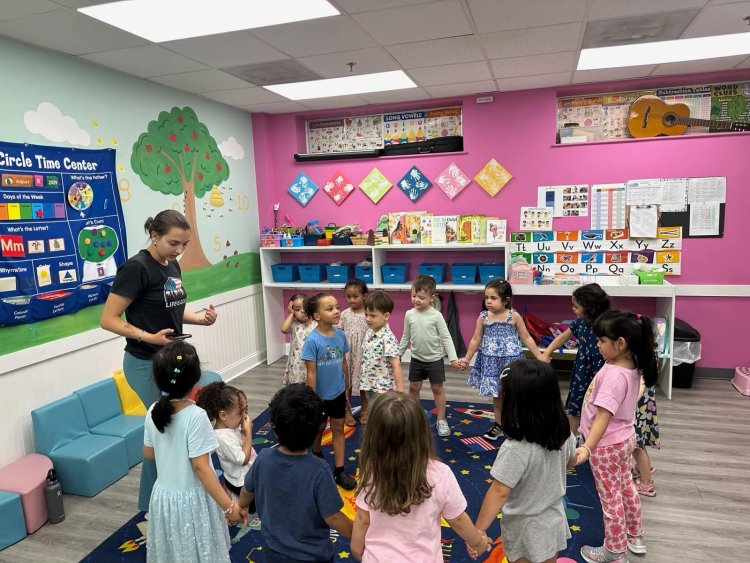Making the Change from Home to Daycare in Reston, Virginia: Parent Advice
Discover nurturing childcare near Reston, VA! Rising Stars Learning Center offers licensed care with engaging activities to support growth and development.

For parents and kids alike, moving from home care to creche marks a big turning point. Being a parent makes one naturally nervous, enthusiastic, and uncertain about how best to bring about the shift as seamlessly as possible. Still, this change can be good for your child and you with careful preparation, patience, and communication. Whether you're exploring options for daycare Reston VA or planning the transition, this thorough guide will walk you from home to creche in Reston, Virginia, with recommendations that will help your child acclimatize and allay any worries you may have.
Seeing the Value of the Change
In a child's childhood, going from being looked after just by parents or family members to attending creche is a significant change. It exposes children to different surroundings with various customs, faces, and expectations. For parents as well as for the child, this change entails juggling new schedules, controlling emotions of separation, and trusting others with the care of their child.
Making this change smoother depends on an awareness of its emotional and developmental consequences. While parents may feel guilt, anxiousness, or concern regarding the quality of care, children may feel anxious, confused, or depressed. Although these emotions are quite natural, the change might result in more independence, social growth, and kid resilience depending on the correct support and preparedness.
Prepare Your Child for Daycare Early on
Moving your child to creche calls for preparation. Starting early, several weeks before the first day helps to reduce the change's shock. Children need time to process the forthcoming change in their daily schedule.
Talk to your child about nursery: even young children might gain some knowledge of the changes. Describe what nursery is and why they will be attending using clear, age-appropriate language. Tell them it's a safe place where they will meet new people, play with toys, and pick up fresh skills. Talk about the interesting events they will participate in—art, music, or outdoor play—then project an exciting journey.
Visit the Daycare Together: Visit the nursery together if at all possible before the formal start date. Show your youngster where they would play, eat, and slumber in the new surroundings. Having meetings with the other children and the carers can also enable your child to feel more at ease in the new environment.
Establish a Routine: Children flourish on regularity, hence starting a routine before the first day of nursery will help to provide them a sense of security. Move your child's food and sleeping times gradually to fit the nursery calendar. This will enable their easy adaptation to the new schedule.
Establishing a Convenient Separation Ritual
Children, particularly those first left off at the creche, may suffer from separation anxiety. Establishing a regular and consoling separation ritual is one of the best strategies to help the parent and child relax.
Keep Goodbye Short and Sweet: Research indicates that long goodbyes might cause anxiety even if it would be tempting to stay with and console your child for a longer duration. Rather, strive to make your goodbye brief, unambiguous, and upbeat. Tell your youngster you'll be back at the end of the day to take them up. Before you go, hug, kiss, and smile reassuringly at them.
Offer Comfort Items: Such as a beloved blanket or stuffed animal—may help some youngsters feel better. Let your youngster bring one of these objects to the nursery if allowed. This would give them daily peace of mind and security.
Use a Transitional Object: A transitional object is anything that ties the youngster to their home surroundings. This might be a little toy, an item of clothes, or a family picture. Children who know they have items from home will be more at ease in their new surroundings.
Developing Effective Communication with Dependents
Throughout the change, good communication between parents and carers is vital. Carers are here to help you; they can also share perceptions on how your child is adapting. Open communication guarantees parents that their child is being well taken care of and allows them to feel confident in the nursery environment.
Discuss Your Child’s Needs and Preferences: Talk to the creche staff about any significant facts you know about your child's needs and preferences. This covers their eating patterns, sleeping schedule, preferred toys, any allergies, and how they communicate annoyance or frustration. The more the carers know about the personality, preferences, and needs of your child, the more they can deliver individualized care.
Ask for Regular Updates: Particularly in the first few weeks, ask for frequent updates on the development of your child. Find out from the carers whether your kid is eating well, making friends, or participating in activities, therefore determining how she is adjusting to the nursery surroundings. Since they enable you to better grasp what your child is going through, these updates will help you and your child adjust.
Work Together to Solve Challenges: Children often experience ups and downs adjusting to creche, hence work together to solve challenges. Work with the creche professionals to identify answers if your kid is struggling with particular facets of the change, such as nap time or socializing with other children. Working together, you can create plans to meet your child's particular requirements.
Helping Your Child Fit the Daycare Setting
Let your child have time to adjust to the new surroundings once they begin nursery. Though there may be some difficulties in the first few weeks, kids will start to feel more at ease if one is patient, sympathetic, and consistent.
Be Patient with Emotional Reactions: Children naturally go through a spectrum of emotions during the change. Be patient with emotional reactions. When dropped off, they might wail; they might object to attending nursery; they might adjust their behavior at home. Usually transient, these reactions are a component of the adjusting process. Keep reassuring them; steer clear of pushing them to act in a particular manner.
Maintain Consistent Routines at Home: Maintaining a consistent schedule at home will help even if the nursery schedule is unique. Your youngster will feel more secure from regular meal times, sleep rituals, and playtime. Children who practice consistency at home feel more in control and their anxiety is lessened.
Praise and Reassure Your Child: When your child does well during the change—that instance, whether it comes to playing with a new buddy or adjusting to naptime—offer compliments and support. Tell them you find their efforts admirable. Tell them attending nursery is a great experience and they should be excited to see their friends and carers the next day.
Handling Resolutions of Setbacks
Although some children find the first change to creche to be seamless, others may have problems. Early intervention is crucial if your youngster finds it tough to adjust.
Acknowledge the Feelings: If your child is experiencing really difficult times, be sure to respect their emotions. Tell them it's alright to be angry, afraid, or anxious. Discuss with them what they are going through and help to affirm their feelings. Hearing from you will help your youngster feel less worried about the change and more understood.
Gradual Transitions: Should your youngster find difficulty, you could choose to discuss a slow transfer. Certain daycare facilities let you start with fewer hours and progressively increase the time your child spends at the facility. This method will enable your child to change at their speed.
Stay Calm and Confident: Children are quite sensitive to their parents' feelings; stay calm and confident. Your child can pick up on your seeming uncertainty or anxiety and start to feel more anxious themselves. Keep cool and sure about your choice to send them to the nursery. Your youngster will feel more safe and comfortable the more positive and encouraging you are.
Final Thought
For parents as much as for children, adjusting from home to creche in Reston, Virginia, or transitioning to Preschool Herndon, can be difficult. With careful preparation, regular routines, honest communication, and lots of support, though, the change can present a chance for personal development. Children who have a good nursery transition frequently grow to be more resilient, independent, and socially adept. Understanding your child's requirements and being patient throughout the process will assist in ensuring that the change goes as seamlessly as it could and build a good basis for their time at nursery.
What's Your Reaction?





















